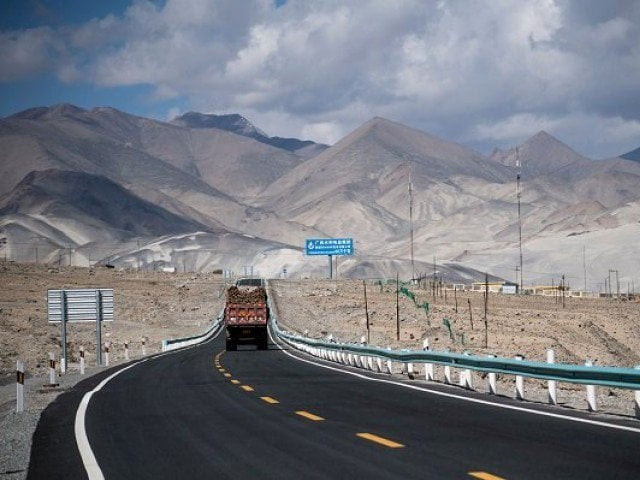In and out of context
Razzak Dawood criticised CPEC and OBOR in an interview

CPEC route. PHOTO: AFP
Neither an economist nor a political being, his statement is remarkable because of what it fails to say. The context is clear to all except the adviser. The US Secretary of State had unequivocally warned against deploying a possible IMF programme to repay the CPEC loans. Other Western countries have misgivings about the rising economic clout of China. China’s foreign minister was in town to renew the game-changing economic relationship with the new government in Pakistan. Before any discussion began, the adviser threw the bombshell of enforcing a one-year long pause in the execution of CPEC projects. Make no mistake. The adviser’s statement was part of this context, not out of context.
There is, however, another context that the adviser chose to ignore. CPEC emerged on the scene, on the Chinese initiative, when the investment rate in the country had crashed to 13 per cent of GDP and economic growth rate was a poor 4 per cent. What to speak of foreigners, even local investors, including the adviser, were not willing to bet on Pakistan. In FY 18, the investment rate was 14.8 per cent and growth rate a decent 5.8 per cent. Without caring for the poor showing on the Ease of Doing Business Index, CPEC contributed the lion’s share. The adviser’s context is different. He is looking for the “share” of the “Sher” and the Chinese companies that inflated contract costs. The suggestion is that the agreements are loaded against Pakistani interest, despite the fact that China had no alternative to Gwadar.
Let’s face it. Pakistan’s bureaucracy has always been signing contracts with its eyes closed. It has no professional capacity to draft an agreement or prepare counter-drafts. This is true of investment agreements with foreign companies as well as bilateral and multilateral aid agreements. What we owe to foreign governments and agencies is routinely paid back on the basis of the invoices received. The so-called “Economic” Affairs Division has no trained economists to challenge these invoices or be ready with own estimates. CPEC was no exception. It should come as no surprise that the country invariably loses its cases at international legal forums. The fine print of law in economic matters is not our forte. The Chinese acted in their own interest, plus they accommodated all of the silly suggestions made by us. They would be more than willing to accommodate other silliness, so long as they can protect their own interest. They would have done it in the quiet of diplomacy rather than the noise of media. There is a civil-military consensus on the economic and strategic dimensions of CPEC. The unconventional change of command on the civil side, with a baggage of ill-informed public pronouncements against CPEC in the past, was bound to lead to some renegotiation. The echoing of international concerns in global media, with no first-hand knowledge of real contents of the CPEC agreements, was a shot in the dark. It did no credit to the government when the Chinese ambassador rushed to the COAS to seek reassurances. There is a beam in our eye.
Published in The Express Tribune, September 14th, 2018.
Like Opinion & Editorial on Facebook, follow @ETOpEd on Twitter to receive all updates on all our daily pieces.















COMMENTS
Comments are moderated and generally will be posted if they are on-topic and not abusive.
For more information, please see our Comments FAQ